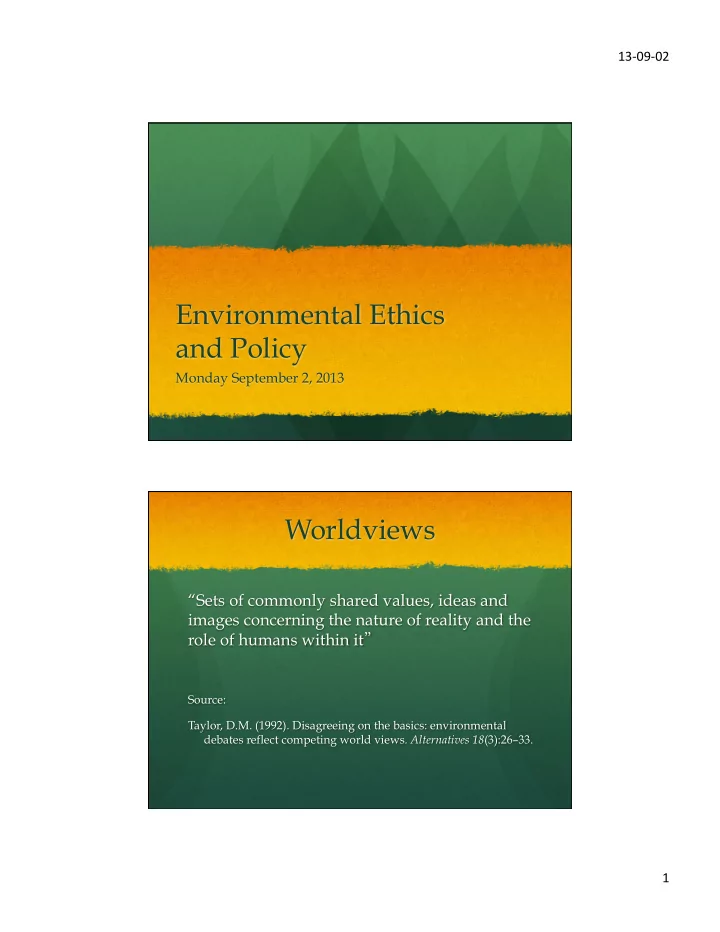

13-‑09-‑02 ¡ Environmental Ethics and Policy Monday September 2, 2013 Worldviews “Sets of commonly shared values, ideas and images concerning the nature of reality and the role of humans within it ” Source: Taylor, D.M. (1992). Disagreeing on the basics: environmental debates reflect competing world views . Alternatives 18 (3):26–33. 1 ¡
13-‑09-‑02 ¡ Expansionist vs. Ecological Expansionist Worldview: Material growth is necessary for human happiness and is possible because of ever- advancing technology and abundant resources. Ecological Worldview: Earth is a finite system that cannot exhibit endless growth. Worldviews Expansionist Worldview Based on 18 th century Enlightenment tradition Capitalism Democracy Industrial Revolution (end of 18 th century) European migrants brought these ideals to North America… 2 ¡
13-‑09-‑02 ¡ Worldviews Expansionist Worldview Science & technology can control nature for human gains Inherent rights of individuals Accumulation of wealth for progress Exploitation of natural resources to achieve these ends “ The frontier mentality ” Worldviews Ecological Worldview Based on Counter-Enlightenment tradition Importance of emotions, instincts, the irrational Nature valued above urbanization & technology Individual rights to personal communion with nature 3 ¡
13-‑09-‑02 ¡ Conservation Movement Early 20 th century Reaction to an expanding industrial society 2 different views, based on expansionist and ecological worldviews Approaches to Conservation EXPANSIONIST ECOLOGICAL Nature: a resource to be Biotic community must be used protected Conservation works with Conservation works against dominant societal values dominant societal values Value of natural areas = Nature is intrinsically value to humans valuable Conservation = Human activities must sustainable exploitation respect ecosystems ’ limitations 4 ¡
13-‑09-‑02 ¡ Environmentalism: 1 st Wave 1960s and 1970s Canadian & US governments : eco-centric approaches to conservation 1 st Earth Day, 1970 (US) Canadian Department of the Environment established, 1971 (now known as Environment Canada) 2 nd Wave of Environmentalism 1985-onward Global warming, ozone depletion, recycling, etc. Re-emergence of ecological worldview Environmental stewardship Sustainable development 5 ¡
13-‑09-‑02 ¡ Environmental Values Placing a value on some aspect of our environment : 1. Utilitarian justification 2. Ecological justification 3. Aesthetic arguments 4. Moral justification Conservation of Nature Utilitarian Justification Environment, ecosystem or species provides humans with direct economic benefits or is necessary for their survival E.g. conservation of Atlantic Cod to protect the livelihood of fishermen 6 ¡
13-‑09-‑02 ¡ Conservation of Nature Ecological Justification A species, ecosystem, etc. provides specific functions necessary for our life to persist. E.g. conservation of forests because trees remove carbon dioxide produced by fossil fuel burning Conservation of Nature Aesthetic Arguments Nature is beautiful, and beauty is of profound importance & value to people E.g. building & preserving urban green spaces like Stanley Park 7 ¡
13-‑09-‑02 ¡ Conservation of Nature Moral Justification Aspects or elements of the environment have a right to exist, & it is our moral obligation to enable them to persist E.g. nature preserves to protect wildlife Clayoquot Sound 8 ¡
13-‑09-‑02 ¡ http://www.cultureunplugged.com/documentary/watch-online/festival/play/6933/jsSendInvitation.php Questions to Consider Who are the stakeholders in this situation? In what ways do these different groups value nature (specifically, the old growth forest) What are the ethical questions raised in this case? What lessons do you think we can learn from the events at Clayoquot Sound? The big one: how can environmental ethics be applied practically in policy-making? Assignments Discussion Leading groups & assigned readings Blog Posts http://envethics.wordpress.com/ Tomorrow… Case Study Workshops Policy Evaluation Paper 9 ¡
Recommend
More recommend